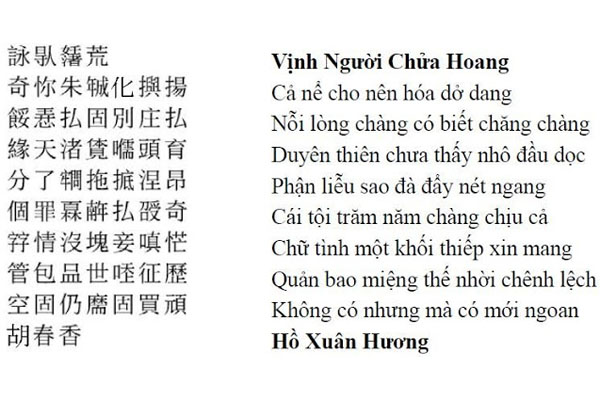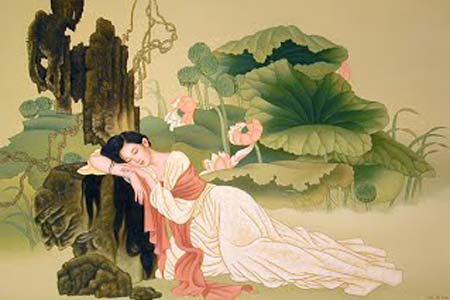It was no doubt Nguyen Duc Binh who, in 1962, sang the highest praise of the poet. His essay in the monthly magazine "Van Nghe" (Arts and Literature) pays her talents homage that while verging at times on rapture, nonetheless includes some observations that are quite relevant.
Drawing on the fact that on her father's side, her family is native of Nghe An. he writes:
'She has a peasant's language; that of Nghe An, accurate and solid stripped of rhetoric but rich in realism."
This characteristic is allied with another that is no less fundamental: maliciousness.
Brought up in Hanoi, in the picturesque district of Khan Xuan on the shore of West Lake, she has a lively and caustic repartee. She has in her, he says, something of a Parisian ragamuffin.
But she is also a passionate and rebellious woman. Hers is the richness of all the great poets facing absurdities and hypocrisy, facing a society controlled by an immutable Confucian ethic which Nguyen Duc Binh compares to "a stagnant pool, on a suffocating summer noon, exhaling mould and putrefaction”.

At heart, he says "Ho Xuan Huong is a "lyrical poet". But "lyricism" must be understood here as the expression of feeling and sensations in their pure state, not yet adulterated, truncated and distorted by a rigid social frame.
"Her tragedy is to be the first poet to have asserted the rights of the heart and of the flesh at a time when reason served as a legitimate label to conceal all crimes" and 'Confucianism had exhausted the vitality of an enclosed society".
Her tragedy is to have dared to have been intelligent and to have used this intelligence at a time when the ignorant man was the universal model.
Ho Xuan Huong's laughter pierces the end of the XVIII century like a sword. In a lyric outburst, Nguyen Duc Binh exclaims:
"Ho Xuan Huong is passion, the courage to live. Difficult, and not without danger in a feudal Asia where the woman has been "educated" since her young days to be afraid of life, a life from which she was obliged to run away to remain faithful to the concept of feminine virtue".
Taking up again his favorite image of the pool, Nguyen Duc Binh goes on:
"She was like a girl who, tucking up her skirt to splash around in a pond, cleared away the water weeds to see the image of the sky reflected on the water".
We thank this wonderful woman who had the courage to live, and challenge a society of mummies and ghosts.



